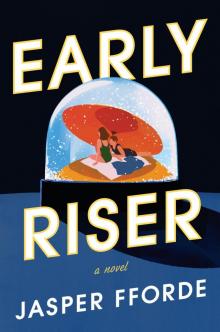- Home
- Jasper Fforde
The Woman Who Died a Lot Page 5
The Woman Who Died a Lot Read online
Page 5
The problem was this: Prime Minister Redmond Van de Poste and the ruling Commonsense Party had been discharging their duties in such a dangerously competent fashion over the past decade that the nation’s stupidity—usually discharged on a harmless drip feed of minor bungling—had now risen far beyond the capacity of the nation to dispose of in it a safe and sensible fashion. The stupidity surplus was so high, in fact, that three years ago Van de Poste had sanctioned the hideously expensive Anti-Smite Shields, in order to guard against the damaging—yet unlikely—wrath of an angry God, eager to cleanse mankind of sin. It was hoped that building a chain of Anti-Smite Shields at massive expense would lower the stupidity surplus and bring the country back toward the safer realms of woolly-headed complacency.
Unfortunately for Van de Poste, and to many people’s surprise, the Almighty had decided to reveal Himself and, in a spate of Old Testamentism not seen for over two millennia, began to punish mankind for its many transgressions. Damage to people and property aside, this had the unintended consequence of making the Anti-Smite Shield de facto sensible, a state of affairs that required a new and increasingly expensive outlet for the nation’s increasing stupidity surplus.
The opposition Prevailingwind Party led by Alfredo Traficcone was calling for a needlessly expensive and wholly unnecessary foreign war to mop up the surplus, an act that Van de Poste declaimed as “one mind-numbingly idiotic step too far.” To appease voters and parliament Van de Poste was pouring millions into a doomed plan to rustproof the Menai Bridge by boiling it in wine, then spending an equally large amount in a vain attempt to fill St. Paul’s Cathedral with Ping-Pong balls, on the rather vague premise that it might be “fun.” While these were indeed dumb, they did not properly address the issue nor size of the burgeoning stupidity surplus, so Van de Poste must have looked around for an expensive decision to reverse—and decided to reinstate SpecOps.
“We have a new mission statement,” said Braxton. “Before, SpecOps was meant to help the police deal with ‘situations outside normal duties.’ Now we have to do the same but to generally overspend, change our minds about expensive technical upgrades, commission a plan to regionalize SpecOps with expensive state-of-the-art control rooms that we will never use and inflate the workforce far beyond the realm of prudent management. And it is from within this new culture of waste and mismanagement that we think Van de Poste hopes to achieve his stupidity surplus reduction target.”
“Does that sit okay with you?” I asked, knowing that Braxton and his tight budgeting had been part of the fabric here in Swindon for longer than anyone could remember.
“I am simply a servant of the state,” he said simply. “If they want me to save money, I save money. If they want me to waste it, I waste it. But it’s not that easy, because to discharge the stupidity surplus most transparently, I have to think up insanely moronic ways of frittering money away—simply pouring cash into a pit and setting fire to it doesn’t work. The SEC would see through that sort of scam night off.”
The SEC was the Stupid Events Commission, the government department created to oversee the safe discharge of the stupidity surplus. Some would argue that it was the SEC’s good management and unimpeachably honest adherence to sound business practices that had gotten us into this mess, but anyone can attribute blame with the benefit of hindsight.
“How’s the reinstatement of the service going for you so far?” I asked.
“Not too bad,” replied Braxton thoughtfully. “We decided to rebrand SpecOps at great expense to bring it all up to date. We designed new logos, uniforms, notepaper and stuff with SpecOps’ new name: EnSquidnia.”
“I don’t like it.”
“No, it’s a stupid name, and the focus group hated it, so we changed it back to SpecOps. That small debacle alone wasted almost three million pounds of taxpayers’ money.”
“I can see you’re taking the Stupidity Surplus Reduction Program with the seriousness it deserves.”
“I do my best. Now, how did things go with Dr. Chumley?”
“He gave me a NUT-4.”
“That’s awkward,” said Braxton. “The position I had in mind would require a NUT-2, but we could probably make an exception.”
“Ah,” I replied, surprised yet somewhat relieved that Phoebe Smalls had also overcooked the goose in the insanity department. “Has the entry requirement been changed since Victor was heading up the department?”
Braxton looked at me with a frown. “I don’t recall Victor Analogy ever being chief librarian.”
I suddenly had an odd feeling. I had assumed that Braxton’s interest in me was SpecOps-related, but he was involved in a lot more than just the Special Operations Network. I wasn’t up for the SO-27 at all. I cursed my own arrogance and felt seriously stupid for going so far as to offer the deputy’s job to Phoebe.
“You . . . want me to run the Swindon Library?” I asked, trying not to make my disappointment show.
“Good Lord no!” said Braxton with a laugh. “I want you to be head of the entire Wessex All-You-Can-Eat-at-Fatso’s Drink Not Included Library Service. Annual budget of one hundred fifty-six million pounds, salary is seventy-two thousand pound plus the most up-to-date Vauxhall KP-3 automobile, a dental plan, free lunches and a generous stationery allowance.”
I said nothing for a while.
“I know,” said Braxton, “tempting, isn’t it? I thought you’d be shocked into silence by the generosity. Just the thing to ease you into a slower pace, eh?”
“I’m not sure I need a slower pace, sir. I was hoping for something more . . . SpecOps-related.”
My disappointment would not have been hard to divine, and the smile dropped from Braxton’s face.
“Oh, Lord,” he said, covering his mouth with his hand in embarrassment. “Did I give the impression I wanted you to head up SO-27? I apologize if I did.”
I thought for a moment. He hadn’t, actually. I had simply assumed it, probably as a result of a little too much delusive hope.
“No, sir, it was my error.”
“Gosh,” he said as another thought struck him, “you must have worked hard to convince Dr. Chumley to give you aNUT-4 classification. You didn’t use the old ‘pregnant with an elephant’ gambit, did you?”
“Of course not. That would have been ridiculous.”
We both fell silent for a few moments.
“Listen here,” he said, “can I be honest with you, Thursday?”
“I’m going to say yes when I should probably say no.”
“We all slow down. Sometimes through age and sometimes through . . . circumstance. I’m seventy-six next June, and I’m out two weeks before then. I still have much to offer, but . . . well, sooner or later I’m going to make a humongous mistake—the sort that kills people, and I don’t want to be here when I do.”
He thought for a moment of the impossibility of the last statement.
“You understand what I mean?”
“Yes,” I replied, “but I’m only fifty-four.”
“But in that time you’ve had a lot of mileage. Head the of Wessex Library Service is a cushy number, and this is why I want you in at the top: I’d like you to liaise closely with Divisional Commander Smalls, who will be reestablishing the Literary Detectives over the next few weeks.”
I took a deep breath, and Braxton continued.
“It’s time to move on and out, Thursday. Phoebe is a good choice. Qualified, fearless, smart, nuts—and good with stats. I want you two to get along. It’ll be better for you, her and the service. Now, how about it?”
“I’ll . . . have to discuss it with Landen.”
“I expect nothing less,” he said as his order arrived. “By Jove, this looks good.”
We ate while Braxton talked at some length about his daughter’s latest drunken escapades and how they were a huge worry to Mrs. Hicks. But I wasn’t really listening. Somehow I didn’t really think a career of saying “Shh!” and stamping return dates was really my thing. I could go
freelance at the drop of a hat and join any private detective agency on the planet with a single phone call. But if I did join the Wessex All-You-Can-Eat-at-Fatso’s Drink Not Included Library Service, I was still in a government agency, and in the loop, ready to step in when Phoebe fell flat on her small and very perfect nose.
Within half an hour, I had thanked Braxton for his time and limped out of Yo! Toast.
6.
Monday: TJ-Maxx
Many people still thank that TJ-Maxx is an outlet for last season’s designer clothes, bought in bulk. The same people still think IKEA is there to sell flatpack furniture and Home Depot’s primary interest is DIY. They’re not and never were—and after the 2004 scandal regarding the SpecOps involvement with Lidl and Aldi, their position within the retail landscape might be slightly more precarious.
Millon de Floss, A Longer History of SpecOps
I walked through the Brunel Centre feeling a sense of disappointment mixed with the realization that until my health improved, things were going to be very different. I couldn’t do what I wanted to do, which led me to the inevitable conclusion that I couldn’t be who I wanted to be. My purpose was suddenly blunted, and I didn’t like it.
I arrived at the Swindon branch of TJ-Maxx at a little after two. I knew as well as anyone that the store hadn’t been deliberately set up as a bargain store for end-of-line designer garments, but rather a high-security facility for the imprisonment of dangerous criminals. Swindon’s most celebrated convict had been Oswald Danforth, whose punishment was to be trapped in an endlessly recurring eight-minute loop of time. In his case while his girlfriend, Trudi, tried on a camisole. She never knew about the loop, of course—but Danforth did. That’s why it was called TJ-Maxx: Temporal-J, Maximum Xecurity. It had been runby the ChronoGuard. The official title was “Closed-Loop Temporal-Field Containment,” but SO-12 simply called it being “in the loop.” It was cruel and unusual, sure, but it was cheap and required no guards, food or health care.
Or at least it had. There were no prisoners now—not since the ChronoGuard was disbanded and all its technology decommissioned.
I found Landen staring at the frying pans on the second floor, wondering, as he usually did, whether they were more expensive than at the co-op and, if so, what the point was of selling them.
“Hey,” I said.
“Hey,” he replied, putting back a cheese grater before adding, “No cookies at the hunt, sir.”
“What?”
“The password?”
“Oh. ‘It’s not a cookie, it’s a . . .’ Shit. Hang on.”
As I stood there trying to remember the last word, I saw Landen’s hand move to his pocket. Not usually an issue, only I knew he kept a COP357 there, a small pistol that packed enough power to punch holes in . . . well, almost anything.
“Newton,” I said with a stupid smile. “It’s a Newton. ‘It’s not a cookie, it’s a Newton.’ ”
Landen breathed a sigh of relief and took his hand out of his pocket. “Don’t do that,” he said. “It just makes me jumpy.”
“Sorry.”
“How did it go?”
“Pretty shittily.”
I told Landen all about Braxton’s offer, and how Phoebe Smalls would be heading up the Literary Detectives’ office, and how I felt that everything was just falling down around my ears because of the blasted accident. I may even have mentioned something about “unfairness” or “a waste of good experience” before I’d gone on to a Level 2 Rant at that point, the sort where you raise your voice in public and sound like an idiot, but without realizing it. I paused at the end, expecting him to agree, but he didn’t. He simply stared at me with an expression of benign conciliation.
“Look,” I said, “I’m kind of looking for agreement here.”
He took a deep breath. “Listen, Thursday, I’m your biggest fan. I’m your husband, lover, best friend, confidant, back rubber, bridge partner. You’ve even got one of my kidneys. I have invested in Thursday futures my entire life and not regretted it for one moment. I’m the last person to stand in the way of anything you want to do and would follow you anywhere. But even I think you should be taking it easy. They damn near killed you, and . . . well, I think you’ve done enough for the moment. You deserve some downtime. We all deserve some downtime. A change of pace.”
Landen had been on at me since I turned fifty to slow down. The accident had made it easier for him. Before, he was a man in love. Now he was a man with a mission to protect the one he loved. And he was making it hard to ignore him. But I tried nonetheless.
“What are we here for anyway?” I asked. “None of us shop at TJ-Maxx.”
“Aornis Hades,” he said. “We need to find her.”
“Any particular reason?”
“Because SO-5 has failed, and finding Aornis is the only way to get rid of the mindworm.”
“What mindworm?”
“The one she gave to . . . someone we know.”
“Have we talked about it?”
“Often. That’s part of the mindworm.”
“Ah.”
I followed Landen to the manager’s office. The assistant manager rose to shake our hands. He was an earnest, helpful young man, part of the retail industry’s fast-track scheme to have people at a regional sales level in as little as twenty-six years. He said his name was Jimmy-G and that he’d read our request and was keen to help. We explained to him that we wanted to see the security-camera footage for the day that Aornis was released, and he said he had to clear that with head office, so he went out of the room to make the call.
“So let’s suppose I slowed down,” I said to Landen. “What would I do?”
“As Braxton suggests: become chief librarian.”
“Aside from that.”
“You could start a restaurant. You do really good Sunday roasts.”
“A restaurant that only opens one day a week is destined to fail,” I pointed out.
“Then that’s our unique selling point—Sunday lunches . . . on weekdays.”
“You’ve got it all planned out, haven’t you?”
“No, I’m making it up as I go along.”
“A restaurateur?”
“Okay, maybe not. But your career path has been heading in only one direction for a while now, and, biggest fan or not, I don’t want to lose you.”
“And I don’t want to be lost.”
“Then tell Braxton you’ve changed your mind. That you’ll take the job.”
And at that moment the assistant manager walked back in.
“That’s all cleared with head office,” he said with a smile. “If it were anyone but you, Detective Next, we’d not entertain the idea. In fact, helping you now makes me feel like what I should be doing. I received my Letter of Destiny last week. I would have been running all the enloopment facilities for SO-12 after I was retired from field duty when a jump to the sixteenth century dumped me in the forty-fifth due to a gimbal-lock precession error on the fluxgates.”
“What does that mean?”
“I’ve absolutely no idea. I didn’t get the ChronoGuard career. I got the retailing one. Ask me about monthly sales figures, dismissal procedures and weekend comparison stats and I’m your man. This way.”
He led us through to the security office, which was of a larger-than-normal size. On the main console were several smaller monitors that surrounded a central, larger one, and they all looked a bit dusty. In fact, the whole room looked very disused, and several cardboard boxes of wire hangers and security tags were lying on the floor.
“No one has used this place since they switched off the enloopment engines two years ago,” said Jimmy-G. “Before my time, I might add.”
After the facility was shut down, the prisoners had been transferred to conventional prisons, but Aornis Hades was different. With a rap sheet that included extortion, blackmail, thought crimes, theft, torture and murder, she had her sentence commuted to quadruple life with added life. She was transferred out, but t
hat was the last anyone heard from her. Quite where she was transferred to, who had transferred her and whether she ever got there was anyone’s guess. It was why looping was so perfect for her. No one to memory-manipulate.
The assistant manager threw several switches, and after a wait of several minutes for the valves to warm up, the central monitor sprang into life. Jimmy-G punched in the date and rough time, and a broad image of the shop’s interior appeared.
“Here,” said Jimmy-G, “it’s easier if you do it. If you want to change cameras, use this switch. To shuttle back and forth, it’s this knob here.”
We found her by the checkout, a well-dressed young lady with a sour expression and her features partially hidden beneath a large, floppy hat. It was definitely her, though— the Hades chin and nose were unmistakable. On either side of her were two prison guards, the first of whom was holding Aornis by the arm and the second of whom was holding a clipboard.
“Can you get his badge?” I asked, and Landen zoomed in further.
“Quinn,” he said as I scribbled it down on a notepad, “and the second is Highsmith.”
“Anything else?”
“Wait,” said Landen, zooming and shifting so he could read the clipboard that was tucked under Highsmith’s arm.
“It looks like ‘Tesco,’” muttered Landen, staring at the indistinct lettering. “That can’t be right.”
“Aornis liked shopping.”
“In Abercrombie & Fitch, she did,” said Landen, “not Tesco’s.”
“I can give you a hard copy,” said Jimmy-G, and he printed one, which was just the same: hazy and indistinct, but this time on paper instead of a screen.
We searched some more, but the only other picture of Aornis and the two guards was as they were leaving the facility two minutes later. We stood up and thanked the assistant manager as we walked out.
“Glad to be of help,” he said, shaking our hands and giving us some discount vouchers. “Tell your son that Jimmy-G would have been proud working under him. If I had. Which I won’t.”

 First Among Sequels
First Among Sequels The Eyre Affair
The Eyre Affair The Eye of Zoltar
The Eye of Zoltar The Woman Who Died a Lot
The Woman Who Died a Lot The Fourth Bear
The Fourth Bear Lost in a Good Book
Lost in a Good Book Something Rotten
Something Rotten The Well of Lost Plots
The Well of Lost Plots The Big Over Easy
The Big Over Easy The Constant Rabbit
The Constant Rabbit The Last Dragonslayer
The Last Dragonslayer The Song of the Quarkbeast
The Song of the Quarkbeast One of Our Thursdays Is Missing
One of Our Thursdays Is Missing Early Riser
Early Riser Early Riser_The new standalone novel from the Number One bestselling author
Early Riser_The new standalone novel from the Number One bestselling author Something rotten n-4
Something rotten n-4 The Song of the Quarkbeast tld-2
The Song of the Quarkbeast tld-2 The Song of the Quarkbeast: Last Dragonslayer: Book Two
The Song of the Quarkbeast: Last Dragonslayer: Book Two The Fourth Bear nc-2
The Fourth Bear nc-2 Lost in a Good Book tn-2
Lost in a Good Book tn-2 The Well of Lost Plots n-3
The Well of Lost Plots n-3 Thursday Next in First Among Sequels
Thursday Next in First Among Sequels First Among Sequels tn-5
First Among Sequels tn-5 The Eyre Affair tn-1
The Eyre Affair tn-1